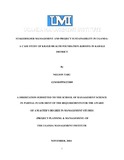| dc.contributor.author | TABU, Nelson | |
| dc.contributor.author | Beinebyabo, Adrian (supervisor) | |
| dc.contributor.author | Mugabe, Robert (Supervisor) | |
| dc.date.accessioned | 2017-06-05T13:29:07Z | |
| dc.date.available | 2017-06-05T13:29:07Z | |
| dc.date.issued | 2014-04 | |
| dc.identifier.citation | APA | en_US |
| dc.identifier.other | 12/MMSPPM/27/009 | |
| dc.identifier.uri | http://hdl.handle.net/20.500.12305/162 | |
| dc.description | A Dissertation Submitted to the Higher Degrees Department in Partial Fulfillment of the Requirements for the Award of a Master’s Degree in Management Studies (Project Planning and Management Option) of Uganda Management Institute. | en_US |
| dc.description.abstract | This study sought to establish the influence of stakeholder management on project sustainability in Uganda using a case study of KIHEFO. The study was guided by three objectives with the first being to find out the relationship between stakeholder identification and sustainability of KIHEFO. The second objective was to establish the effect of stakeholder analysis on the sustainability of KIHEFO and the third one was to find out the effect of stakeholder participation on the sustainability of KIHEFO in Kabale District. A correlational case study research design was employed using both qualitative and quantitative research approaches. A sample of 103 respondents was used and the response rate was 100%. Data collected was presented using frequencies and percentages to show the distribution of respondents on different items. The collected data were prepared for analysis by editing, then categorizing and entering it into the computer using the Statistical Package for Social Sciences (Version 16). Pearson’s Linear Correlation Coefficient (r) was used to determine the level of association between the variables. The study findings showed that: there was a significant positive effect or relationship between stakeholder identification, stakeholder analysis, stakeholder participation and project sustainability of KIHEFO. The study concluded that stakeholder management positively affects project sustainability. Therefore the researcher recommended that project managers should put greater emphasis on stakeholder management to influence the sustainability of projects. Stakeholders should be involved and be given chance to participate in project activities according to priorities to stimulate sustainability. KIHEFO should look at a sound stakeholder management strategy and that should be viewed as a core in ensuring robust project sustainability which is the cornerstone of a well-functioning project through stakeholder identification, analysis and full participation in all project activitie | en_US |
| dc.language.iso | en | en_US |
| dc.publisher | Uganda Management Institute | en_US |
| dc.subject | Stakeholder management | en_US |
| dc.subject | Project Sustainability | en_US |
| dc.subject | KIHEFO | en_US |
| dc.subject | Kabale District | en_US |
| dc.title | Stakeholder Management and Project Sustainability in Uganda; A case study of KIHEFO in Kabale District | en_US |
| dc.type | Thesis | en_US |

